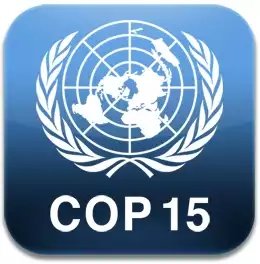Course: From Kyoto to Copenhagen, Negotiating the Future of the Planet
Summary
In this interdisciplinary course students studied climate science and policy and applied their knowledge conducting field research interviewing delegates to the 15th Conference of the Parties (COP 15) to the UN Framework Convention on Climate Change (UNFCCC) in Copenhagen. The course spanned fall and spring semesters of 2009/2010. During fall semester, students prepared for their field research with a general overview of climate change science, impacts and adaptation, building expert knowledge about the international climate negotiations, developing a research plan, and practicing interview and video skills. The class attended COP 15 in Copenhagen where students met with and interviewed conference delegates representing national governments and scientific, environmental, civil society and business organizations. During the spring semester, the research team reflected on their observations of the conference, wrote research papers based on their interviews, and presented their work in a variety of venues, including a professional academic conference at Penn State University.
Learning Goals
The goals for the research team members are to:
- Attain general literacy about the science of human caused climate change, the potential consequences of climate change, and solutions;
- Gain deep knowledge about the international climate negotiations, including the process, institutions, critical issues, and objectives and motivations of key players;
- Develop the ability to analyze the positions of parties to the negotiations on key issues and the social, cultural, ethical, political, economic, environmental, and technological factors that shape the positions that parties take;
- Build skills for collaborative research and public communication that uses qualitative research methods, interviews, video and audio equipment, and analysis and interpretation of interview data;
- Understand the purpose, limitations, and benefits of digital/online media and the applicability and influence of press, social networking, blogging, viral, and other emergent tools for various communication needs.
Context for Use
Description and Teaching Materials
See course syllabus, which includes details of readings and assignments.
Course syllabus
Teaching Notes and Tips
Assessment
References and Resources
Videos of interviews with COP 15 delegates can be viewed online: http://blogs.dickinson.edu/cop15/.
Citation
Leary, N. (2014). Course: From Kyoto to Copenhagen, Negotiating the Future of the Planet. Retrieved from http://www.camelclimatechange.org/view/teachingunit/51cbfb967896bb431f6bfd62


![[creative commons]](/images/creativecommons_16.png)